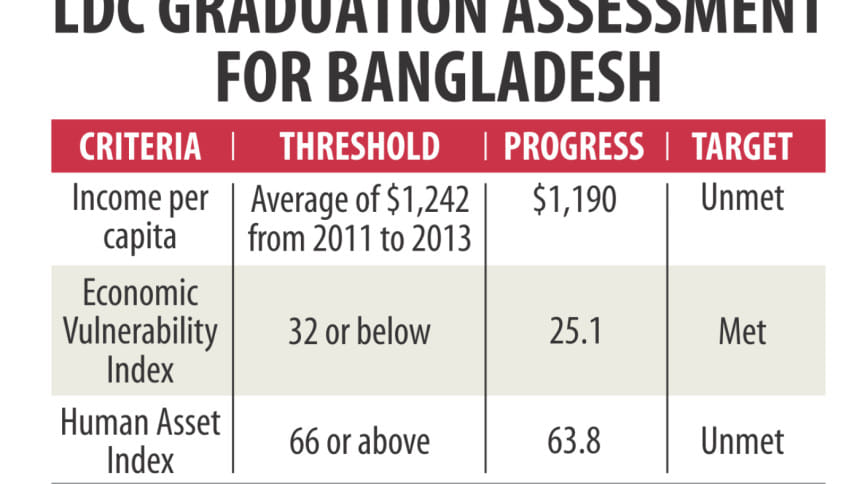Graduation from LDC status to cut into exports

Bangladesh's exports will fall between 5.5 percent and 7 percent if the country loses duty-free market access upon its graduation from the grouping of the least-developed countries, the Centre for Policy Dialogue said yesterday.
“Both product and market diversification will be critical to Bangladesh's smooth graduation,” said the think-tank in its analysis on the United Nations Conference on Trade and Development's Least Developed Countries Report 2016.
Exports will fall 6.5 percent to 7 percent if only Bangladesh graduates from the LDC status and loses duty benefits while the other nations retain their existing preferential treatment, said Towfiqul Islam Khan, research fellow of the CPD.
But the fall in exports will stand at 5.5 percent if all LDCs lose the duty-free market access together, he said while presenting the analysis at an event held at the Brac Centre Inn in Dhaka.
Even if Bangladesh graduates from the LDCs in 2024, the country will still retain all the privileges it enjoys under the current arrangement until 2027 to facilitate a smooth transition.
The cost of losing LDC-specific international support can be offset by momentum and sound preparation, the think-tank said.
As LDCs, 48 countries are entitled to a total of 136 support measures including special treatment on official development assistance, climate finance, preferential market access and rules of origin, patent flexibilities and aid for trade.
Bangladesh is projected to graduate in 2024 meeting all three criteria: the income criteria, the Human Asset Index (HAI) and Economic Vulnerability Index (EVI), according to the Unctad report. An LDC can graduate if it meets two of the three criteria, or riding on the income criteria if the country's income doubles.
At present, Bangladesh meets only the criteria under the EVI.
But in 2018, Bangladesh will have a fairly good possibility to also meet the HAI criteria and perhaps the income criteria too, according to the CPD analysis.
If Bangladesh meets all of the three criteria, it will be only one of the three countries to have done so. The other two countries are Djibouti and Yemen.
The graduation process for Bangladesh will kick in 2018, and the country will need to meet the criteria again in 2021 to avail the final recommendation.
The CPD analysis, which is based on the Unctad report as well as the think-tank's own inputs, said the graduation alone is not enough; the foundation for subsequent development is also needed.
The LDCs need to develop productive capacities and bring in structural transformation of the economy.
The Unctad report said the graduation is the first milestone in a marathon of development, not the winning post of a race to escape the LDC category.
Speaking at the media briefing, CPD Executive Director Mustafizur Rahman said: “The Unctad report is related to our national aspiration.”
He said Bangladesh has to prepare a strategy for graduation.
Remittance has played a significant part in recent years in raising the per capita income in Bangladesh, said CPD Distinguished Fellow Debapriya Bhattacharya. But the healthy flow of remittance may not persist in the coming days.
Similarly, the exchange rate of taka has also come under stress from the fall of pound sterling and the euro as a result of Brexit.
“So, it will be better to put emphasis on improving performance under the Human Assets Index. If we can provide quality education and health care it will help to increase productivity, which will ultimately help achieve faster sustainable growth.”
Bangladesh needs labour-intensive industries, safe work place and adequate infrastructure for structural transformation, he said.
Economic growth and exports alone cannot ensure development.
“Rather, the growth has to be inclusive. Social inequality has to be reduced and environment has to be protected. There has to be rule of law and governance,” Bhattacharya added.
Bangladesh has to bargain hard to realise more funds from international sources to help the country take on the climate change-induced challenges, said CPD Research Director Fahmida Khatun.
The Unctad report said some of the 16 countries that are projected to graduate by 2025, including Bangladesh and Bhutan, are likely to reach the milestone through broad-based development of productive capacities, diversification and structural economic transformation.
The report said LDCs are facing three major vicious circles: poverty trap, commodity trap and chronic current account deficits.
“Thus graduation, in principle, should mark the point at which an LDC has risen sufficiently from these vicious circles to rely primarily on its own strengths and on international markets for its subsequent development, without requiring the maximum concessionary treatment from development partners.”
Bangladesh was the largest recipient of remittances among the LDCs in 2015, when migrant workers sent home $15.4 billion, according to the Unctad report.
The country was also one of the highest official development assistance recipients in 2014 after it got $1.4 billion.
The CPD recommended focus on a longer-term development pathway rather than on meeting statistical eligibility for graduation.
Sustainable post-graduation will critically hinge on maintaining the past momentum. The quality of structural transformation will be a key determinant in terms of smooth graduation, it said.
“A smooth graduation strategy should include industrial policies that enhance productive capacities and raises competitive strength of Bangladesh economy. Structural transformation is contingent on rural development.”
CPD Additional Research Director Khondaker Golam Moazzem was also present.

 For all latest news, follow The Daily Star's Google News channel.
For all latest news, follow The Daily Star's Google News channel. 



Comments